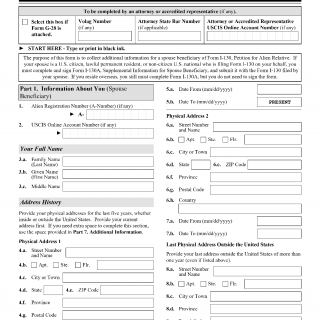Form I-130A. Supplemental Information for Spouse Beneficiary
Form I-130A, Supplemental Information for Spouse Beneficiary, is a form used by U.S. citizens or lawful permanent residents to provide additional information about their spouse when filing Form I-130, Petition for Alien Relative. The main purpose of the form is to provide the U.S. government with additional information about the beneficiary spouse, including their contact information, employment history, and previous marriages.
The form consists of several parts, including personal information, employment history, and previous marriages. The important fields to consider when compiling/filling out the form include the petitioner's name, address, and personal information, as well as information about the beneficiary spouse's employment history and previous marriages. It is important to provide detailed and accurate information to avoid any delays or issues with the application.
The parties involved in the process are the U.S. citizen or lawful permanent resident petitioner and the beneficiary spouse. It is important to consider the impact of any changes in the petitioner's circumstances, such as a divorce or separation, on the outcome of the application.
When compiling/filling out the form, the petitioner will need to provide their name, address, and personal information, as well as information about their spouse's employment history and previous marriages. Additional documents that must be attached include evidence of the bona fide nature of the marriage, such as joint bank accounts, leases, or utility bills, as well as any additional documentation requested by the USCIS.
Examples of when Form I-130A might be necessary include when a U.S. citizen or lawful permanent resident is seeking to sponsor their spouse for a green card. Strengths of the form include its ability to provide additional information about the beneficiary spouse, which can help to strengthen the case for approval. Weaknesses may include the need for extensive documentation and evidence, as well as the potential for delays in processing.
Alternative forms or analogues to Form I-130A may include Form I-130, Petition for Alien Relative, which is used to sponsor a family member for a green card. The difference between the two forms is that Form I-130A is used to provide supplemental information about the beneficiary spouse, while Form I-130 is the primary form used for sponsoring a family member.
The successful completion of Form I-130A can have a significant impact on the future of the petitioner and beneficiary spouse, as it can lead to the approval of the green card application and provide a pathway to permanent residency. The form can be submitted by mail to the USCIS, and it is important to keep a copy of the form and any supporting documentation for the petitioner's records.

